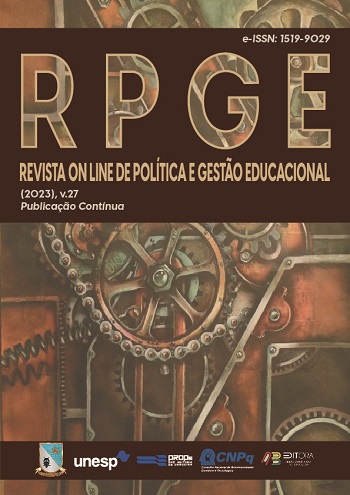Development of practical measures to improve the qualifications of university teachers in a changing educational environment
DOI:
https://doi.org/10.22633/rpge.v27i00.18528Keywords:
Teacher, University educational process, Professional development, Improvement of professional competenciesAbstract
The growing change in standards in higher education is a consequence of the improvement of technologies, social trends, and growing digitalization. Professional development, which is becoming increasingly important in the field of higher education, is aimed at adapting to such a dynamic development, especially affecting teachers. The purpose of this article is to consider the demand for advanced training of university teachers and efforts aimed at meeting the increased requirements for advanced training of personnel in the higher education system. Thus, the authors consider the process of professional development in the field of improving subject knowledge. The authors conclude that professional development becomes a strategic necessity for teachers in a specific context and can be implemented, on the one hand, by considering the expectations and wishes of the participants and, on the other hand, by ensuring the sustainable institutionalization of the concept of professional development.
Downloads
References
ABDUNAZAROVA, N. F. Basic principles of the organization of professional development of teaching staff. In: LIFELONG LEARNING: CONTINUING EDUCATION FOR SUSTAINABLE DEVELOPMENT, 13., 2015, Saint-Petersburg. Proceedings […]. Saint-Petersburg, Russia: [s. d.], 2015.
ANTIPINA, E.V. Institute of Continuing Professional Education in the local Northern environment: problems and ways of development. Arkhangelsk, 2017.
DZASEZHEVA, L. et al. Impact of Multimedia Technology on the formation of foreign language communicative competence in students. Revista Conrado, v. 19, n. 90, p. 297-303, 2023.
GADZAOVA, L. P. et al. Use of digital technology by a teacher to improve the effectiveness of the process of students’ training and professional self-identification. Revista on line de Política e Gestão Educacional, v. 26, n. esp. 2, 2022. DOI: 10.22633/rpge.v26iesp.2.16562.
PIVNEVA, S. et al. Raising the level of motivation of economics students for studying english using the Myenglishlab Blended Learning Platform. Revista Conrado, v. 19, n. 90, p. 270-276, 2023.
RICHTER, A.; VIGERSKE, S. Fort- und Weiterbildung von Lehrerinnen und Lehrern: Die Bedeutung der dritten Phase am Beispiel einer Evaluation der Lehrer/-innenfortbildung im Land Baden-Württemberg. Richter/Vigerske, 2011. Disponível em: http://www.bwpat.de/ht2011/ws14/richter_vigerske_ws14-ht2011.pdf. Acesso em: 10 mar. 2023.
SEKERIN, V. et al. Transformation of the labor market and the necessary professional competencies of employees under the influence of the development of technologies and practical sciences. Nexo Revista Científica, v. 35, n. 04, p. 942–949, 2022. DOI: 10.5377/nexo.v35i04.15532.
STITZ, G. Multiplikatorische Fortbildungen mit E-Learning-Unterstützung. Berlin: Druck und Verlag epubli GmbH, 2017.
TOLMACHEV, M. et al. Development of Students’ Digital Competence When Using the “Oracle” Electronic Portal. European Journal of Contemporary Education, v. 11, n. 4, p. 1261–1270, 2022. DOI: 10.13187/ejced.2022.4.1261.
UNITED NATIONS EDUCATIONAL, SCIENTIFIC AND CULTURAL ORGANIZATION (UNESCO). World Education Monitoring Report. Paris, France: UNESCO, 2017. Disponível em: https://unesdoc.unesco.org/ark:/48223/pf0000261971. Acesso em: 10 mar. 2023.
ZUEVA, F. et al. Professional identity of teachers as a component of university corporate culture. Revista on line de Política e Gestão Educacional, v. 26, 2022. DOI: 10.22633/rpge.v26i00.17336.
Published
How to Cite
Issue
Section
License
Copyright (c) 2023 Revista on line de Política e Gestão Educacional

This work is licensed under a Creative Commons Attribution-NonCommercial-ShareAlike 4.0 International License.
Manuscritos aceitos e publicados são de propriedade da Revista on line de Política e Gestão Educacional. É vedada a submissão integral ou parcial do manuscrito a qualquer outro periódico. A responsabilidade do conteúdo dos artigos é exclusiva dos autores. É vedada a tradução para outro idioma sem a autorização escrita do Editor ouvida a Comissão Editorial Científica.










